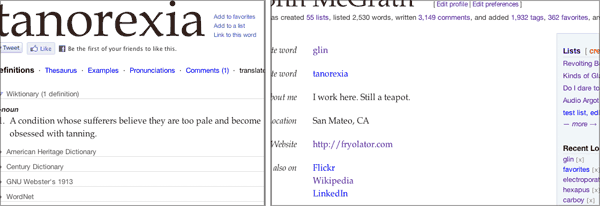The 2010 Wordnik Developers Challenge drew many impressive entries, and, after much deliberation, we’ve selected the winners. An enormous thank you to everyone who entered. We very much appreciate the thought and effort put into the projects, and the feedback we received has improved the API for everyone. So, without further ado …
Games
There were a few versions of hangman submitted, but Hangnik for Android, by KoderMonkeys, added some unique twists and is the winner in the games category. It has a pleasant interface, and game play is initiated by a example sentence rather than just a blank word, which adds a nice MadLibs flavor.
Education
A lot of entries had educational aspects, but Logophilia.org stands out. It lets you explore patterns in Wordnik in a meandering, non-goal-oriented fashion, and has a delightfully clean design.
Productivity
One of Wordnik’s goals is providing language information when and where it’s needed, and for that reason twtdict, by Michael Howland, is the winner in the productivity category. Using Twitter as the delivery channel allows anyone with a SMS-capable phone — basic feature phones as well as smart phones — to easily get dictionary and thesaurus data. It’s a simple but powerful idea, and well implemented.
Best in Show
Because it marries Wordnik and mobile technologies, and is accessible to the majority of the world using basic phones (it even works on the LG 100), twtdict also wins the “best in show” category. If you’re filling out a form and need to know the meaning of a word, if you’re reading a paperback on a bus, if you’re in a bar and trying to settle a bet, twtdict lowers the bar for being able to access a powerful resource. It’s fun, practical, and democratic.
Honorable Mentions
We were also impressed with Romin Irani’s Wordnik GTalk Bot and the Speculative Grammarian’s Scrabble Cheater’s Dictionary, both of whom receive honorable mentions.
We’ll be contacting the winners shortly with more information on your prizes. Congratulations, and thanks again to everyone who entered!



